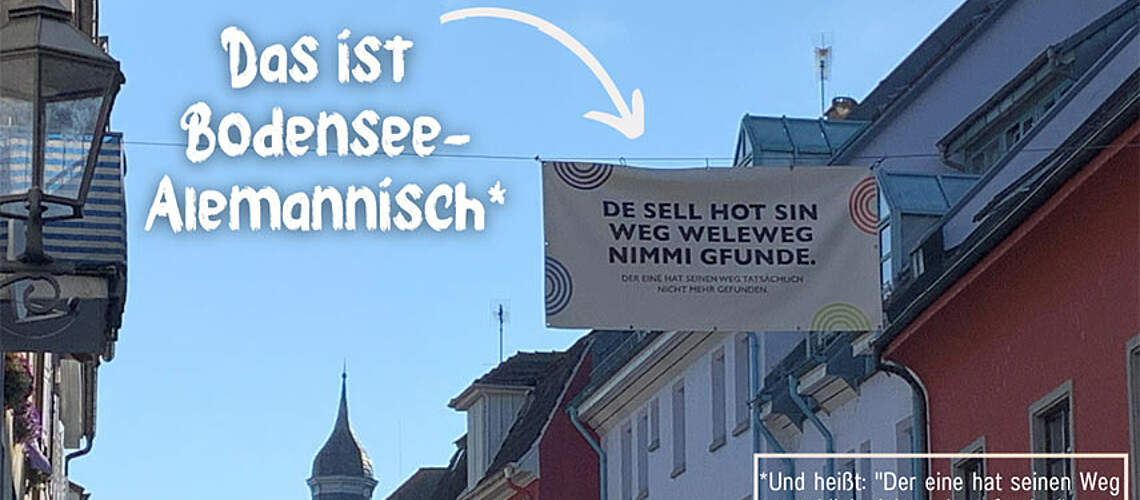
Dialects and learning German: German is not just German!
A report by Anne Pajarinen (Director of Carl Duisberg Training Center Radolfzell on Lake Constance)
Those who learn German in a course can usually communicate in High German after a short time. However, if the language is spoken in regional dialects, most learners of German only understand "Bahnhof". Anne Pajarinen, the director of Carl Duisberg Center in Radolfzell on Lake Constance, is Finnish herself and shares her experience of learning German with dialects.
💭 "Can you please speak High German?"
I was born and raised in Finland. When I first came to Germany almost 30 years ago, my first stop was in the Bavarian Upper Palatinate ("Bayerische Oberpfalz") - near the picturesque city of Regensburg. Already in the first few days I met several people whom I could not understand at all because they spoke the local dialect. "Excuse me, can you please speak High German?" was one of my standard phrases back then. Another word for dialect is Mundart - it's the way of speaking in a certain region.
🥨 The Franconian dialect in Bavaria
A few years later - the next challenge: an exchange year at the University of Würzburg. The Franconian dialect spoken there was much easier for me to understand than the dialect in the Upper Palatinate. Perhaps my ears were already better trained for the different dialects in Bavaria. The softly spoken consonants suited me very well, since I still had difficulties with the pronunciation of the hard consonants (k, p, t). As a Finn, I also got along very well with the rolling "R".
💡 Swabian („Schwäbisch“) is not so difficult
After a few years, I changed states and moved to Stuttgart. Swabian is spoken in the capital of Baden-Württemberg. The very first sentence I heard at the airport shortly after landing was "Hascht Durscht?". But I didn't understand this sentence and had to ask my friend what the father was asking his son. "Are you thirsty?" was the answer. This was the perfect introduction to the Swabian dialect. "Hast du" equals "hasch", "bist du" equals "bisch", and "st" is pronounced everywhere like at the beginning of the word, i.e. "scht".
🗣️ German dialects at Lake Constance
I came to Lake Constance 15 years ago. Even though we are still in Baden-Württemberg, the local dialect is quite different from Stuttgart. In fact, Swabian is not spoken here, but Lake Constance Alemannic. As a border region, the Lake Constance region is very rich in dialects. In addition to Lake Constance Alemannic, Swiss German ("Schwiizerdütsch") is spoken on the southern shore of the lake, the Austrian variant of German at the eastern end, and Bavarian and Swabian in the north and northeast.
🇩🇪 Dialects are part of German culture
Even though dialects are difficult to understand, especially for us non-native speakers, they are an important part of German culture and make the different regions so unique. Most people in Germany can also speak High German, you just have to ask them to! For some years now, I have been trying to learn to understand Swiss German. To do this, I listen to a Swiss radio station every now and then. I still don't understand everything and have to concentrate a lot while listening, but it's getting better and better.
Dialect is spoken not only in rural regions but also in large cities. At the Carl Duisberg locations in Germany, in addition to Bodensee-Alemannisch (Radolfzell), you can also hear Bairisch (Munich), Kölsch (Cologne), Hessian (Marburg), Berlinerisch* (Berlin) and Saarländisch (Saarbrücken). Of course, High German is spoken and taught in our language schools ;-)
*Berlinerisch is not a dialect, according to Wikipedia, but a so-called "metrolect", a kind of metropolitan language consisting of various dialects.
Learn German online or at one of our Language Schools in Germany or sign up for a free Training Lesson now!
